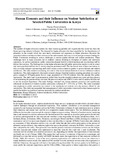| dc.contributor.author | Gakobo, T. W | |
| dc.contributor.author | Ochieng, I | |
| dc.contributor.author | Nzioki, Paul M | |
| dc.date.accessioned | 2022-03-21T12:31:14Z | |
| dc.date.available | 2022-03-21T12:31:14Z | |
| dc.date.issued | 2019 | |
| dc.identifier.issn | 2222-2839 | |
| dc.identifier.uri | http://hdl.handle.net/123456789/5559 | |
| dc.description.abstract | The number of higher education seekers has been increasing globally and in particular this sector has been the
fastest growing industry in Kenya. The demand for higher education has been amplified by the liberalization of
education in the country which has seen heavy investment and expansion in higher education. However the
increased student enrolment in these institutions has unfortunately been met with reduced government funding for
Public Universities resulting to serious challenges in service quality delivery and student satisfaction. These
challenges have in many occasions led to students’ unrests resulting to disruption of studies and university
operations. As service institutions, public universities depend heavily on both teaching and non-teaching staff to
deliver their services. The funding crisis in the higher education has left public universities unable to only to attract
and retain qualified staff but also to recruit adequate permanent staff. This has forced most of these institutions to
rely on casuals and part time teaching staff which causes a serious threat to quality in service delivery and student
satisfaction. The study aimed at examining how and to what extent human elements of service influences student
satisfaction. The study employed a descriptive research design. Stratified random sampling procedure was used to
pick a sample of 1976participants from a target population of 270,120 students from the selected five public
universities. The study used a questionnaire to collect data from the sampled students and a pick and drop process
of administering the questionnaires was used. Regression analysis and ANOVA were used to analyze the data and
to test the research hypotheses. The study findings indicated that, human elements positively and significantly
influenced satisfaction of student at public universities in Kenya (F = 2575.326, p< 0.05). The study concluded
that employee in public univerities are critical in the satisfaction of students with the services offered by the
universities. This study recommended that management of public universities invest well in their human capital to
enable the deliver the quality of services necessary for student satisfaction. | en_US |
| dc.language.iso | en | en_US |
| dc.publisher | Human Elements and their Influence on Student Satisfaction at Selected Public Universities in Kenya | en_US |
| dc.subject | Human Elements, Student Satisfaction, Public Universities | en_US |
| dc.title | Human Elements and their Influence on Student Satisfaction at Selected Public Universities in Kenya | en_US |
| dc.type | Article | en_US |

